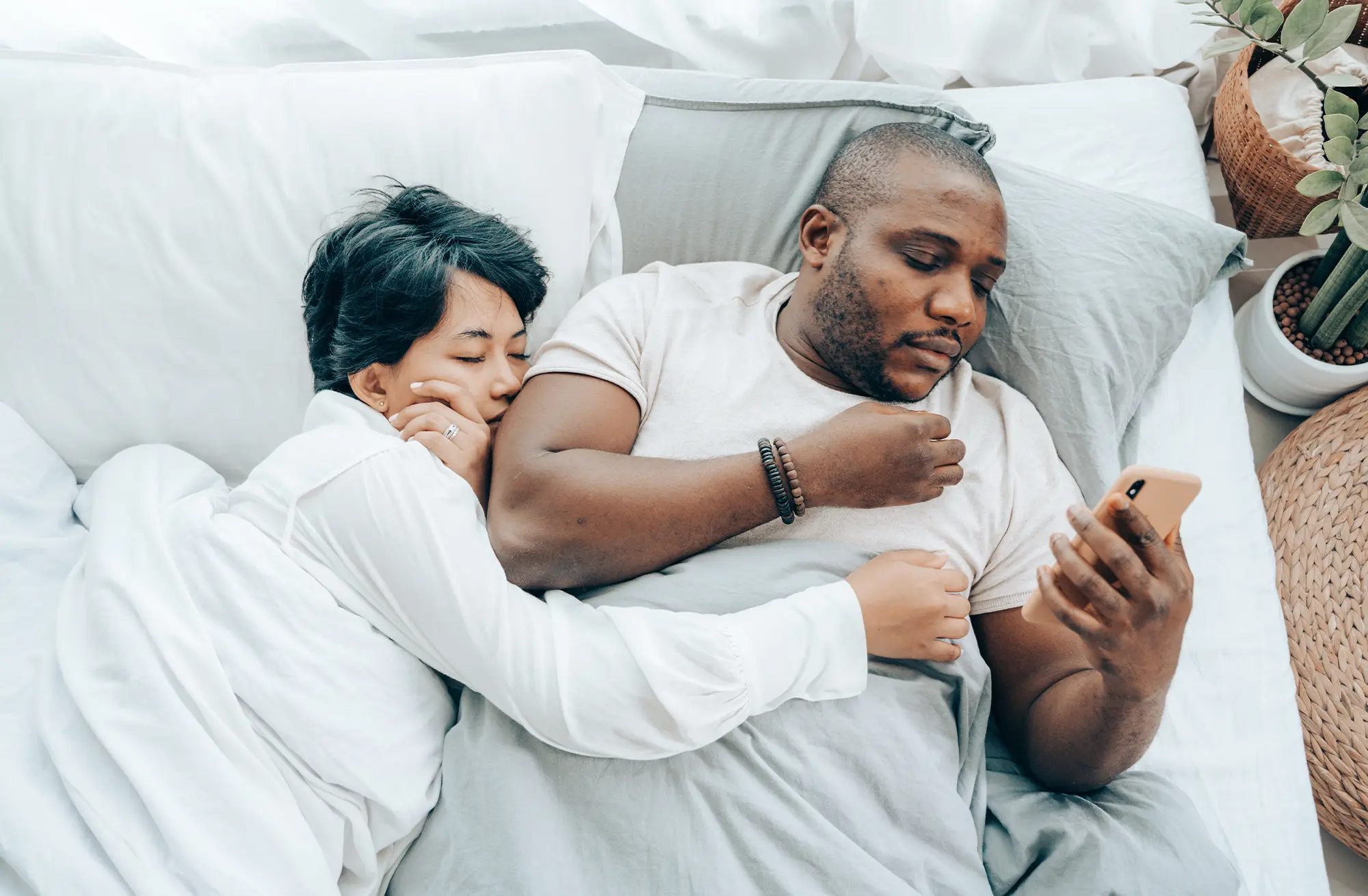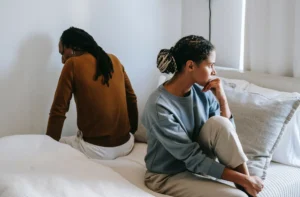A sad reality as a couple’s therapist is observing that many couples or at least one partner in many relationships seem to prefer to engage in technology-based activities rather than spend quality time with their partners. More often than not the same individuals rate their relationship as a higher priority than spending time on their screens but their everyday behaviours strongly indicate that technology is a higher priority. This can leave the other partner feeling alone, undervalued and rejected. When referring to technology I am referring to anything ranging from social media, news online, streaming services and work-related activities such as constantly checking emails. To put it simply, you can’t multitask your relationship. You are either present and connecting with your partner or you are doing something else.
Why does this happen?
Humans are social beings and without strong bonds our brains do not develop to their potential. As such our brains are actually wired in such a way that the default state of the waking brain is to connect with others. That is probably why if you have had a sustained quiet period where you are not distracted by technology or engaged in work you might feel lonely or a desire to connect with friends, family or your partner. This is your mind and body’s way of telling you that relationships are an important value that you need to invest in. The reality of the present day is that there is a good chance you have not had a sustained period where you have been disconnected from technology or work. Prior to the mid 1990s we probably all felt more desire to connect with others. There is no denying that there were plenty of distractions back then. Albeit they were far less stimulating than the distractions of today. Yeah sure, you could watch TV all day but sooner or later most people would get bored. TV was passive viewing, you had very limited control over what and when you viewed things. Things are much different now. We can engage in entertainment technology and work anytime we want from the bus to the toilet seat and it is very stimulating. The endless scroll, the constant refresh and the multitude of platforms you can keep jumping to is endless. Given our human nature we very quickly find ourselves in a dopamine cycle of reward and withdrawal. When this occurs the parts in your brain primed for connection are turned off. Evolutionarily speaking this is not a bad thing. When you are feeling emotional turmoil or grief it is important to be able to switch tasks and concentrate on work or problems that need to be solved. Most people can relate to this when they are going through difficult times. Things feel more bearable during the day when they are busy but they begin to feel more overwhelmed when things are quieter in the evening or perhaps when they are trying to sleep.
Before the mid 1990s you could distract yourself with work, reading a book, doing chores etc but sooner or later these mastery based activities would become fatiguing and you would have to face your emotions and more likely your connection needs. The problem is that our brains are not designed to have the constant stimulation that technology provides today. Of course there have always been other ways to block these things by way of substances and other addictions and the reality is that technology use is another addiction. Just because many of us have the same problem does not mean we are not all addicted. Remember that once upon a time smoking was normal but people still suffered the ill effects of smoking. When you are addicted to technology the constant stimulation and dopamine cycle becomes the prime motivation and the person becomes less primed for connection, emotion and bonding. Essentially your connection and bonding has been stolen by the ‘attention economy’.
What are the dangers of this trend?
There is a real danger that talking to your partner or even simply sharing a meal without a device becomes a difficult task. It is much easier to go to your device for that good feeling than to put in the work and the delayed gratification that comes with investing in your relationship. Unchecked this will lead to disconnection and relationship dissatisfaction. Or one person might feel fine as long as you are not distracted from their addiction but the other partner is left feeling lonely and isolated due to the other’s maladaptive self soothing cycle.
There is also a real danger that the addicted partner will eventually feel depressed and anxious when they are disconnected from their fix. Part of the reason for this is that there is not inherent value in a lot of the technology they consume. That is, you are moving toward a dopamine hit, not investing in something you value like relationships, health, reading, career, education, creativity etc. Eventually this starts to affect your sense of self and it may also affect the way your partner starts to see you. Further, as you find yourself more switched on to technology it is likely you feel less attuned to your partner and empathic connection in general. Losing the ability to be in touch with your own feelings and that of others is very concerning on an individual and social level. The risk is you lose time and fail to realise the damage you are causing in your own life. Sooner or later you are going to wake up and feel lonely.
Why simply trying to cut down on technology on its own won’t work and what you can do to improve things in your relationship and life instead.
If you believe technology might be a relationship and life interfering I would suggest you take a concurrent approach to change. Simply trying to stop or reduce your use of technology is going to be very difficult. You are up against thousands of engineers who are trying to get and keep your attention for their products. Because attention plus time equals money through ads, data and subscriptions. You might start off with good intentions but the slide back will likely come sooner than later. I would suggest taking some time out with your partner to discuss what is important to you as individuals and as a couple. Think about life when you are in your 80s and imagine you are looking back through a couples photo album of your life. Imagine now that many of the pages are filled with social media posts, news articles, work emails and TV series. There’s no denying that some of these things might have been pleasurable and worthy of enjoyment or distraction. However, the pages in your album devoted to your technology use is not going to touch you, it’s not going to bring that smile, tear or gratitude toward a life lived. Now imagine a different album, one that is filled with joint experiences, adventure and most importantly things that you value as an individual and as a couple. Living in accordance with your values brings a colour to life that is far deeper than the short-termed pleasure one experiences through maladaptive self-soothing. I would then recommend identifying some values important to both of you and discussing and committing to living more in line with them by setting some goals. This is a good way to get both parties off in a new direction that will be bonding and reinforcing. In addition, I would recommend getting to know each other more through quality conversation and curiosity. Finally, rather than just focusing on trying to reduce the amount of time you use technology generally I would focus on forming some new couples habits that are technology free. You could start by going for a walk together on a regular basis without any devices, you might agree that there are no devices on during dinner, you could have date nights and leave your phones at home or at least on silent, you could agree that there are no devices in the bedroom and phones and laptops get put away one and half hours before bed, you could have a regular technology free getaway or weekend.
The My Love Your Love App is all about helping couples thrive. Once you work through empathic listening and conflict resolution the app switches focus to couples’ growth and deeper connections. My Love Your Love will help you identify values, and couples’ goals and facilitate deeper conversation and curiosity. It is an amazing app that takes you on a journey back to each other. You might find it ironic that we are mentioning a technology app to bring you closer in this particular article. However, My Love Your Love is a genuine and deeply thought-through app created by two married Clinical Psychologists and Couples Therapists. All the magic happens between the couples. As such it is an investment and it is not always an easy process. It is not addictive, you won’t get hooked on it. It is not as enjoyable as watching 60-second clips of shiny or funny images. Rather, it requires commitment from two people who are invested in their relationship. Like most things in life doing tasks of value requires more effort but brings a much greater reward than simply engaging in pleasure. We recommend couples try and commit to 15-20 minutes a day on the app most days of the week. It is a relationship guide or bible that walks you through concepts, interventions and strategies.
Shahn and Helen are with you every step of the way through video explainers and each partner has their app sync with the other as the app is interactive and you need to work through it together to proceed. Through My Love Your Love we aim to bring positive change and couples growth.




